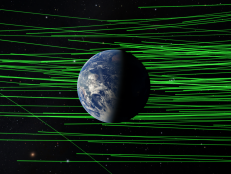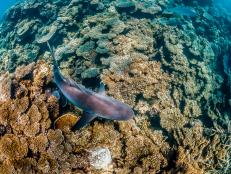All Space Articles
Showing 226 - 240 of 491 results
Behold, the Sun as You’ve Never Seen It Before
The European Space Agency’s Solar Orbiter reached the halfway point between the Earth and the Sun to snap an amazing super-high-res picture. You can zoom in on the image to reveal the stunning details of the Sun’s surface. It’s like a Google Earth…but for the Sun.
25 Years In the Making, the James Webb Telescope Is Coming to Science Channel
The world’s most powerful observatory - the James Webb Space Telescope – is set for launch later this month after more than 25 years of development and construction. Science Channel, the leader of all things space, will take viewers inside this incredible feat of technology and its launch with two specials airing Tuesday, December 21 at 10 PM ET/PT with a Post-Launch Special to air Sunday, December 26 at 10 PM ET/PT.
Saving Earth from Killer Asteroids
Only about 40% of an estimated 25,000 near-Earth asteroids with the potential to destroy the planet have been detected. Scientist Dr. Ed Lu, along with his nonprofit B612 are working to create a way to detect the other 60%.
Space Hotel Built for Luxury and Research in Low Earth Orbit by 2027
Blasting off into low Earth orbit may not be every traveler’s idea of a quiet getaway, but builders of the first space hotel are creating the ultimate exclusive destination. Voyager Station is scheduled to be operational by 2027 and will offer $5 million luxury suites, fine dining, and live shows to space tourists.
Curiosity Daily Podcast: Skin Print, Testing Birth Control, Race To Bring Mars Home
You’re going to learn about efforts to print astronaut skin in space with their own blood, the mystifying side effects of birth control, and the race to bring soil samples back from Mars!
Chinese Space Debris is Heading for a Crash Landing on Earth
Debris from a Chinese rocket is expected to fall into Earth in an uncontrollable re-entry this weekend. Although the probability of the debris landing in a populated area is low, questions are now being raised about the responsibility of different countries to correctly dispose of their space junk.
Curiosity Daily Podcast: Earth's Atmosphere May Be Rusting the Moon
Learn why the concept of zero is newer than you might think, how you can worry more productively, and why the Earth’s atmosphere might be rusting the moon.
Space Debris Reaches Critical Levels Threatening Future Science
Space junk is a growing threat to mankind’s future. Old rocket parts, failed satellites, and pieces from previous space missions form a cloud of 750,000 pieces of debris circling the Earth at high speed. Scientists say an urgent clean-up is needed to prevent an environmental crisis in space.
Here Comes Artemis I (Rescheduled, again)
NASA's long-awaited Artemis 1 uncrewed moon mission and next generation of spacecraft has been delayed for a second time. The rocket was initially scheduled to launch on Aug. 29, 2022, at 8:33 AM ET, but was delayed due to an issue with the engine bleed. Watch Space Launch Live: Artemis-1 on Science Channel to see the moment of liftoff. (Launch Date Pending) (Updated Sept 7, 11:00AM)
Curiosity Daily Podcast: Improve Your Self-Control, Replace Your Kitchen Sponge, and Naming Our Sun and Moon
Learn about why the sun and moon don’t have names; why kitchen sponges are grosser than you think (and what to do about it); and how you can improve your self-control with the right feelings of guilt.
Curiosity Daily Podcast: Jet Lag Is Worse When You Travel East, Earth’s Wandering Poles, and Geminid Meteor Shower
Learn when you can catch the Geminid Meteor Shower this month, and why it’s unique; why jet lag is worse when you travel east; and research into how the Earth’s wandering poles may have caused our ice age.
What We Learn from the Lunar Surface
Sure, the Moon is cool to look at, and fun to think about it. And it literally affects us here on the Earth: without the Moon, we’d be missing half our tides, and likely our planet’s rotation wouldn’t be as stable as it is.
Could Sharks Live in Space?
Europa to be specific. Yes, I know it’s a crazy question, but hear me out. This will be fun.
What’s the Farthest Thing We Can See?
Beyond the most distant star you can see with the naked eye, beyond the most extreme faint galaxy that we discern with our telescopes, lays something extraordinary: the leftover light from the big bang itself.
When and Where is the Chinese Rocket Falling Back to Earth?
What goes up, must come down. On April 28th, a Chinese Long March 5B rocket went up, successfully delivering its payload, a new section of the Tianhe space station, into orbit. But now the 21-ton rocket is coming down, uncontrolled.
























